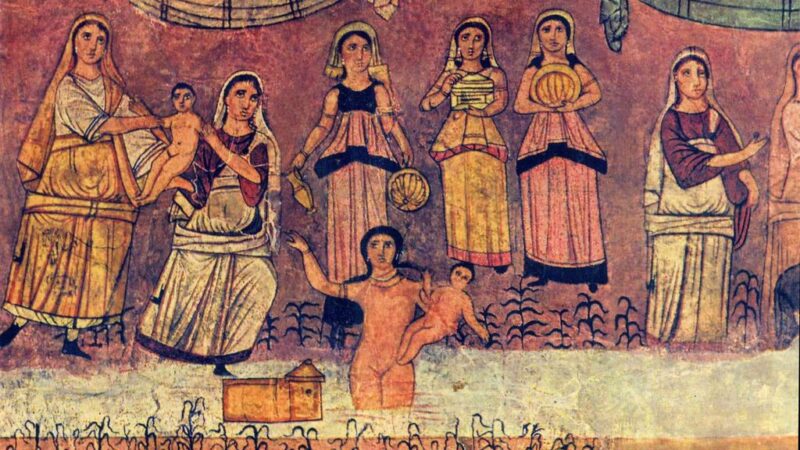Women Launch the Exodus and Confront Book Banning in Jerusalem
By Ayala Emmett
The first day of 2016 featured women in politics. It happened in synagogues last Shabbat on January 1, as we read the opening chapters of the Book of Exodus in which six women make history and emerge as political catalysts. All are remarkably brave; all are women who make bold moves in the political/ethnic/religious arena of their time. Framed in contemporary political lexicon, the women speak truth to power, brand civil disobedience, and defy book banning and closing of the mind in Jerusalem. My reading of Torah within the current politics of book banning and fear-mongering in Jerusalem is informed by the idea that in a Jewish universe, word and world are in frequent dialogue.
Most of us are unaware of the significance of the six Exodus women because much of Torah is about men’s sphere of action, and when the text occasionally includes women it is difficult to pay attention because they are often hushed by much of rabbinic commentary. Nowhere, however, does Torah in a single Parsha give voice to six agentive women who are consequential and united across ethnicity, religion and class differences. It would be helpful to situate the women and explore how they launch the history of the Exodus and how they insert critical thinking in contemporary political debates.
The Torah narrative embeds the six women in the Exodus story at its early stage of oppression, slavery and attempted genocide. The women are sociologically paired, two are midwives of ambiguous ethnicity, two are Levite mother and daughter, and two are non-Israelite women of high social rank. The women’s involvement in the politics of their time is provoked by Pharaoh, who according to the text orders the two midwives, Shifrah and Puah to violate their professional obligation, “when you deliver the Hebrew women look at the birthstool: if it is boy kill him.” Pharaoh invades the gendered domestic/private sphere of childbirth and the midwives without hesitation step into the dangerous political terrain. They are defiant, they “did not do as the king of Egypt told them,” and they offer us the first biblical lesson in civil disobedience.
The text is (deliberately?) ambiguous about the identity of Shifrah and Puah. Their ethnicity has been powerfully debated in rabbinic commentary, but has typically remained unresolved. The majority of the rabbis, including Rashi the 12th century commentator, identify the midwives as Hebrew women, while other sages view them as Egyptian. Their actions, however, are unequivocal, they defy Pharaoh’s edict to kill all Hebrew newborn boys.
The story turns to the actions of the mother and daughter whose identities are unambiguous, they belong to the ethnic Israelite minority, they are Hebrew women of the tribe of Levi. The mother “conceived and bore a son” and her son is not killed because the midwives have refused to comply with Pharaoh’s edict. The Levite mother enters the political danger-zone when she decides to save the life of her baby boy.
Yet, the political threat hangs over the domestic/maternal concealment and after three months the mother realizes that she can no longer hide her son. She makes the most heartbreaking decision that a mother can make, to send away her baby in the hope that he would be rescued. The Levite mother, still nameless, constructs a waterproof basket and places her son among the reeds on the Nile, hoping for a non-Israelite’s compassion. The baby’s sister is watching from a distance, as her brother becomes the first biblical child refugee.
Entering the narrative is the fifth woman who immediately knows that this is a child of the oppressed minority, “This must be a Hebrew child,” says Pharaoh’s daughter who without hesitation decides to save and shelter the baby. A women’s conspiracy of civil disobedience ensues, the baby’s sister offers to find a Hebrew woman to nurse him, the princess agrees, and the boy, still nameless is returned to her weaned, becomes her son and she names him Moses. Mother, sister and his adoptive Egyptian mother are joined in giving life to Moses in defiance of Pharaoh’s death decree. Moses, as the text tells us, grows up in Pharaoh’s house, kills an oppressive Egyptian taskmaster, escapes to Midian and marries Zipporah, a Midianite of high rank the sixth woman in the Parsha text.
Zipporah, Moses’ non-Israelite wife emerges as resolutely agentive in a harrowing journey. When God tells Moses to go back to Egypt to “free my people,” a very reluctant Moses returns with Zipporah and his two sons and on the way God wants to kill him. The “him” in the narrative that God seeks to kill is not named. The text is far from clear whether God wants to kill Moses or one of his sons, but whomever it is, Zipporah in that critical moment of facing God, acts quickly and decisively, she circumcises her son and for an unexplained reason it works “and He lets him go.” Zipporah closes the circle of the six women as she, like the others is impelled to exit the domestic sphere to saves a life; she enters the Israelite religious sphere that could have been dangerous if entered inappropriately.
In a Jewish universe that values connecting past and present, the six Exodus women who cross ethnic and class differences offer a view that undermines recent Jerusalem politics of nationalist text-banning. The political turmoil in Israel swirls over Ronit Rabinyan’s book “Borderlife” that Bennett, the Minister of Education views as such a threat to the “purity of Jewish identity” that he ordered it banned from schools. The objection to the book is rooted in the nationalist dread of shifting/crossing ethnic boundaries since it describes a love relationship between a Jewish woman and a Palestinian man in their full humanity. Blurring ethnic boundaries and illuminating people’s common humanity run through “Borderlife” as well as in the six women narrative. In Bennett’s Jerusalem, the text of Parshat Sh’mot that would most certainly be forbidden. The women’s actions (like Borderlife’s protagonists) legitimate porous/shifting ethnic religious and class boundaries that defy current nationalist zealots’ particularistic vernacular. The Exodus women’s inter-ethnic relations, alliances, parenting and marriage produce an intervention in the addictive political ideology of identity purity. The Exodus narrative sanctions life in an Egyptian household and ultimately legitimates mixed identities. Moses who was chosen to be the liberating, law giving leader of the Exodus brought to his role multiple identities, a rescued child asylum seeker, an Egyptian by upbringing an Israelite first by birth and later by choice, and a stranger, a ger, in the land of Midian.
The six Exodus women foreshadow a long list of women peace activists uniting across national/religious identities, Jewish and Palestinian to speak truth to power. The contemporary list stretches from women who have organized after 1967 calling on the government to end the occupation, to recent groups like Women Wage Peace who defy the current moves by the Netanyahu/Bennett government to cast concrete walls and pile barbed wire between Jew and non-Jew. In this political nationalist context the Exodus women arise as six Matriarchs, Imahot, to generations of women of courage who in various ways have been speaking truth to power. They all defy the hegemonic divisive/oppressive story of their time and rewrite across differences a political life-story that embraces compassion and common humanity.
—

Ayala Emmett is Professor Emeritus of Anthropology at the University of Rochester. Born in Tel Aviv, she grew up in a religious socialist Zionist community in Israel, and served in the Israeli army.






Ayala Emmet has written an important piece. It combines biblical scholarship with political analysis, it instructs us on the events of the Biblical Past and brings it freshly into the Present. It is political in the best of ways, bringing a depth of understanding of Jewish values onto the times we are witnessing— the banning of a novel because it deals with a relationship between an Israeli Jewish woman and a Palestinian. Kol Hakavod Ayala Emmet.
You bring a depth to our blog which I welcome and applaud.
It’s no wonder the Jews who didn’t acpect the testimony of His miracles tried to stone Him to death for saying what you quote above. That was the penalty for blasphemy under the Jewish legal system. It was pretty clear to everyone there He was saying, “I am the God of Israel.”Another passage:Mark 14: 60-64 (ESV)60 The high priest stood up and came forward and questioned Jesus, saying, “Do You not answer? What is it that these men are testifying against You?” 61 But He kept silent and did not answer. Again the high priest was questioning Him, and saying to Him, “Are You the Christ, the Son of the Blessed One?” 62 And Jesus said, “I am; and you shall see the Son of Man sitting at the right hand of Power, and coming with the clouds of heaven.” 63 Tearing his clothes, the high priest *said, “What further need do we have of witnesses? 64 You have heard the blasphemy; how does it seem to you?” And they all condemned Him to be deserving of death.The Jewish leaders at Jesus’ trial were doubly offended by the above, because not only was He claiming to be God, but He was quoting an obvious reference to the Messiah from Daniel 7 (ESV):The Son of Man Is Given Dominion13 “I saw in the night visions, and behold, with the clouds of heaven there came one like a son of man, and he came to the Ancient of Days and was presented before him.14 And to him was given dominion and glory and a kingdom, that all peoples, nations, and languages should serve him; his dominion is an everlasting dominion, which shall not pass away, and his kingdom one that shall not be destroyed.C S Lewis’ statement in “Mere Christianity” concerning those who say Jesus is just a good moral teacher, but not the Son of God, is worth noting:“I am trying here to prevent anyone saying the really foolish thing that people often say about Him: I’m ready to acpect Jesus as a great moral teacher, but I don’t acpect His claim to be God.’ That is the one thing we must not say. A man who was merely a man and said the sort of things Jesus said would not be a great moral teacher. He would either be a lunatic on the level with the man who says he is a poached egg or else he would be the Devil of Hell. You must make your choice. Either this man was, and is, the Son of God: or else a madman or something worse. You can shut Him up for a fool, you can spit at Him and kill Him as a demon; or you can fall at His feet and call Him Lord and God. But let us not come with any patronizing nonsense about His being a great human teacher. He has not left that open to us. He did not intend to.”